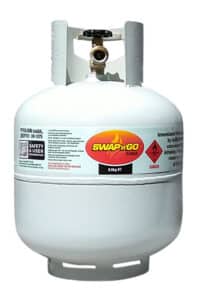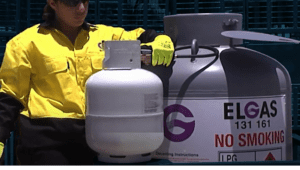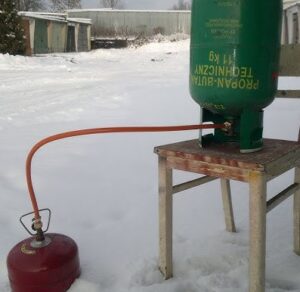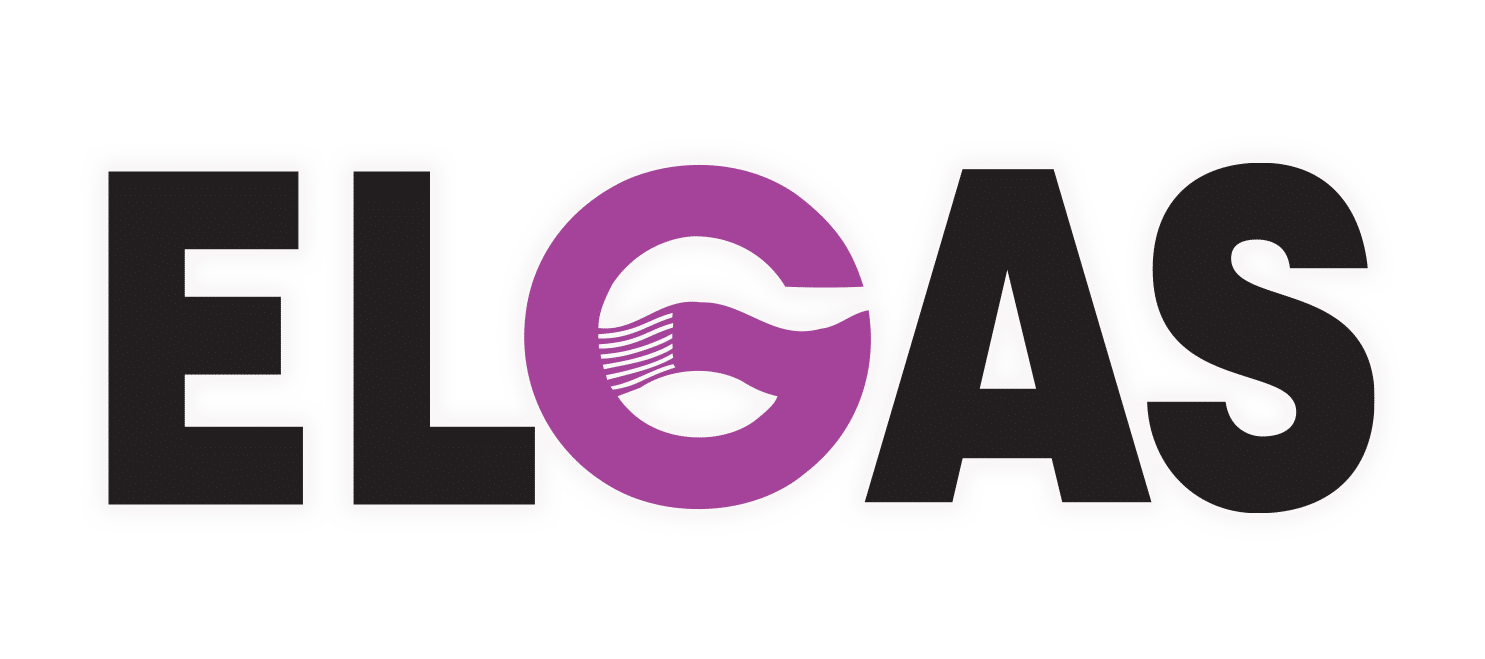Refill Gas Bottle – Fill Gas Bottle – Gas Cylinder Refill at LPG Gas Filling Station How Done
Fill gas bottle is done in two ways: you can refill gas bottle (gas cylinder refill) by weight using digital scales or fill gas bottle by decant gas cylinder refill, using the bleed screw.
To fill gas bottle or bulk LPG tank, it can also be done by a metered tanker.
We’ll look at the details of ‘how to’ when you refill gas bottle (gas cylinder refill) and the pros & cons of both methods of how to refill gas bottle (gas cylinder refill) at an LPG gas filling station (LPG filling station)…
Fill Gas Bottle at LPG Gas Filling Station – LPG Filling Station
You fill gas bottle through the main valve.
 As previously mentioned, to refill gas bottle (gas cylinder refill) at an LPG gas filling station (LPG filling station) can be done in two ways – fill gas bottle by weight or refill gas bottle (gas cylinder refill) by decanting.
As previously mentioned, to refill gas bottle (gas cylinder refill) at an LPG gas filling station (LPG filling station) can be done in two ways – fill gas bottle by weight or refill gas bottle (gas cylinder refill) by decanting.
Gas bottle refilling or refill gas bottle (gas cylinder refill) by weight involves inputting the tare weight (empty weight) and the desired amount of gas to fill gas bottle into a digital scale.
The other method to refill gas bottle is referred to as ‘decanting’, which is how to fill gas bottle at an LPG gas filling station (LPG filling station).
When you refill gas bottle (gas cylinder refill) by weight, the gas cylinder refill hose is controlled by the scale, which shuts it off when the appropriate weight is achieved.
To refill gas bottle (gas cylinder refill) by decanting, a small vent screw is opened which allows gas to vent when the gas in the bottle reaches the full gas cylinder refill level.
The venting gas is the operator’s cue to stop the gas bottle refilling and close both the vent screw and main valve, when they fill gas bottle.
How to Refill Gas Bottle at LPG Gas Filling Station – LPG Filling Station – Video
Disclaimer: This video on How to Refill Gas Bottle is only a supplement and refresher for those who have completed the Elgas refill gas bottle decant LPG filling training course. It is not the complete training course and other training materials apply. Fill gas bottle by decanting must not be attempted by untrained individuals.
Current Inspection Date Required to Refill Gas Bottle at an LPG Gas Filling Station (LPG Filling Station)
No matter which of the refill gas bottle (gas cylinder refill) or gas cylinder refill methods are used to fill gas bottle, gas bottle refilling at an LPG gas filling station (LPG filling station) must be done with a current inspection date.
It is the responsibility of the gas cylinder refill technician at an LPG gas filling station (LPG filling station) to check the inspection date stamped into the neck ring of the gas bottle before they fill gas bottle.
An LPG gas filling station (LPG filling station) cannot refill gas bottle (gas cylinder refill) when out-of-date until they are re-inspected and stamped with a new inspection date.
Fill Gas Bottle – Gas Cylinder Refill Using Digital Scales
 Using digital scales helps ensure proper and safe to fill gas bottle, based on weight.
Using digital scales helps ensure proper and safe to fill gas bottle, based on weight.
When the total weight equals the empty weight plus the appropriate refill gas bottle (gas cylinder refill) weight, you can completely fill gas bottle.
The scales at an LPG gas filling station (LPG filling station) are set for each individual gas bottle refill (gas cylinder refill), based on its empty (tare) weight, as well as the desired weight to fill gas bottle. (see image)
How the Scales Work for Gas Cylinder Refill
The tare weight (empty weight) is stamped into the neck ring by the bottle manufacturer.
The operator inputs the tare weight of the refill gas bottle (gas cylinder refill) into the scale’s keypad.
After inputting the weight to fill gas bottle, the technician connects it to the LPG supply.
The gas bottle refilling or to refill gas bottle (gas cylinder refill) is automatically stopped by the digital scale, after reaching the target weight.
This ensures very accurate fill gas bottle and avoids dangerous overfilling or lost value through under gas cylinder refill.
The fill gas bottle accuracy achieved is why the use of digital scales is the preferred method to refill gas bottle (gas cylinder refill).
Not surprisingly, this is how major suppliers, like SWAP’n’GO®, refill gas bottle (gas cylinder refill).
Faster Way to Refill Gas Bottle with Carousels at LPG Gas Filling Station – LPG Filling Station
A side benefit of using scales, at an LPG gas filling station (LPG filling station), to refill gas bottle (gas cylinder refill) is speed.

The gas bottle refilling line can be pump driven for a faster way to fill gas bottle.
This is not possible with decanting at an LPG gas filling station (LPG filling station), as the operator might be too slow to stop the refill gas bottle (gas cylinder refill) process.
This could result in dangerous overfilling.
Digital scales and pump driven gas bottle refilling also allow for the use of high speed carousels to fill gas bottle, like the SWAP’n’GO carousel in the accompanying image.
In fully automated at an LPG gas filling station (LPG filling station) plants, with refill gas bottle (gas cylinder refill) carousels, even the keypad step can be automated (see image above).
The carousel digitally reads an RFID chip on the cylinder that contains the tare weight, as well as the rest of the manufacturing specifications to fill gas bottle.
LPG Decanting Procedure to Fill Gas Bottle at LPG Gas Filling Station (LPG Filling Station)
Decanting is the gas cylinder refill process seen if you have ever watched them fill gas bottle at an LPG gas filling station (LPG filling station).
To transfer LPG gas from one cylinder to another, you use the decanting method.
 After connecting the gas bottle to a larger LPG storage tank, the trained operator begins gas cylinder refill process until some gas starts leaking out of the loosened bleed screw.
After connecting the gas bottle to a larger LPG storage tank, the trained operator begins gas cylinder refill process until some gas starts leaking out of the loosened bleed screw.
The gas cylinder refill operator at an LPG gas filling station (LPG filling station) is supposed to stop the refill gas bottle (gas cylinder refill) process as soon as liquid LPG starts coming out of the bleeder opening.
The liquid LPG escaping is unmistakable, as it looks like a white cloud.
This intentional venting of gas into the atmosphere, when you fill gas bottle, is avoided with the digital scale method.
Decanting can also result in either overfilling or underfilling the gas cylinder refill, as well as correct refill gas bottle (gas cylinder refill), depending on the gas bottle and the operator filling it.
For example, if the operator is slow to stop the process when the liquid LPG starts to bleed out, the gas cylinder refill could easily become overfilled.
As previously mentioned, overfilling a gas cylinder refill is a significant safety hazard.
Fill Gas Bottle at an LPG Gas Filling Station (LPG Filling Station) – Refill Gas Bottle

When you fill gas bottle at an LPG gas filling station (LPG filling station), it is done using the decanting method.
This is what you see during gas bottle refilling 9kg gas bottles.
After connecting the gas bottle to a larger LPG storage tank, the trained operator begins to refill gas bottle (gas cylinder refill).
They continue to fill gas bottle until some gas starts leaking out of the loosened bleed screw.
Dip Tube Variation Effect on Refill Gas Bottle – Gas Cylinder Refill
In addition to operator performance variances in refill gas bottle (gas cylinder refill), there are inconsistencies in the dip tube lengths.
 Dip tubes can fall out and be missing. The accompanying picture shows some examples.
Dip tubes can fall out and be missing. The accompanying picture shows some examples.
Dip tubes lengths are important because they are connected to the bleed screws.
The fill gas bottle method by decanting operator opens the bleed screw to refill gas bottle until the level of gas cylinder refill reaches the bottom of the dip tube, at which point liquid LPG will start to bleed out during the refill gas bottle (gas cylinder refill).
This is his signal that the cylinder is full and the gas cylinder refill is complete.
Long dip tubes can result in under refill.
Short or missing dip tubes will cause overfill of the gas cylinder refill.
A missing dip tube is the worst case scenario because the entire ullage space would be filled, allowing no room for expansion.
This is one of the reasons that swap is a much safer alternative, as dip tube variances have no effect when you refill gas bottle (gas cylinder refill) by weight.
20% Oversized for Expansion When You Fill Gas Bottle – Gas Cylinder Refill
 LPG vapour pressure rises with temperature.
LPG vapour pressure rises with temperature.
If a gas bottle is exposed to higher temperatures the gas expands, increasing the pressure.
LPG bottles are designed to be full while allowing 20% of the space, called “ullage”, for the natural expansion of the LPG, as shown in the accompanying picture.
To properly fill gas bottle, with the required 20% ullage, should never have a problem.
Overfilling is Unsafe When Gas Bottle Refilling 9kg Gas Bottles
One of the big advantages of gas bottle refilling 9kg gas bottles, or any size bottle, by weight is the avoidance of dangerous overfilling.
When overfilled, a gas cylinder refill has less than 20% ullage, creating the possibility of the unwanted release of gas to the atmosphere, through the pressure relief valve.
The pressure relief valve is incorporated into the main gas valve on the bottle.
It’s actually a valve within a valve that prevents dangerous overpressure situations.
So, overfilling combined with heat can result in gas venting from the pressure relief valve, which creates a significant safety hazard.
This is especially true in the warm Australian climate.
To Refill Gas Bottle is NOT a DIY Procedure
To refill gas bottle (gas cylinder refill) is not a do-it-yourself handyman procedure and should never be attempted by untrained personnel.
 Only trained gas cylinder refill technicians should attempt to fill gas bottle by either method.
Only trained gas cylinder refill technicians should attempt to fill gas bottle by either method.
The trained operators know all about the appropriate procedures.
This includes personal protective equipment (PPE) to wear, static – free clothing, proper cylinder grounding, static electricity hazards, ignition sources, fire protection and more.
In-depth safety training is mandatory for the refill gas bottle (gas cylinder refill) technician at an LPG gas filling station (LPG filling station).
Doing it incorrectly could result in cold burns (liquid LPG is -42°C), fire or even an explosion.
In addition dangerous overfilling can occur.
The simple message for people who are thinking about trying gas cylinder refill of their own refill gas bottle (gas cylinder refill)…

Just DON’T do it!
- BBQ – Gas and Charcoal BBQ Features – Charcoal BBQ vs Gas BBQ Comparison - March 31, 2025
- GPL Gas (GPL Fuel) – GLP Gas – LPG Gasul: GLP-GPL Gas Station - March 26, 2025
- Think LPG When Building a New Home - February 26, 2025
